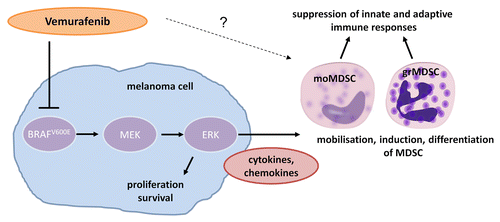Figures & data
Figure 1. Vemurafenib abrogates the immunosuppressive effects of MDSC in melanoma patients. Vemurafenib inhibits mutant BRAFV600E signaling in melanoma cells, not only limiting their proliferation and survival, but also interfering with the secretion of soluble factors that are responsible for the recruitment, induction and differentiation of myeloid-derived suppressor cells (MDSC). Vemurafenib appears to have no direct effects on MDSC induction, though a potential modulation of MDSC function by vemurafenib has not been studied yet.
